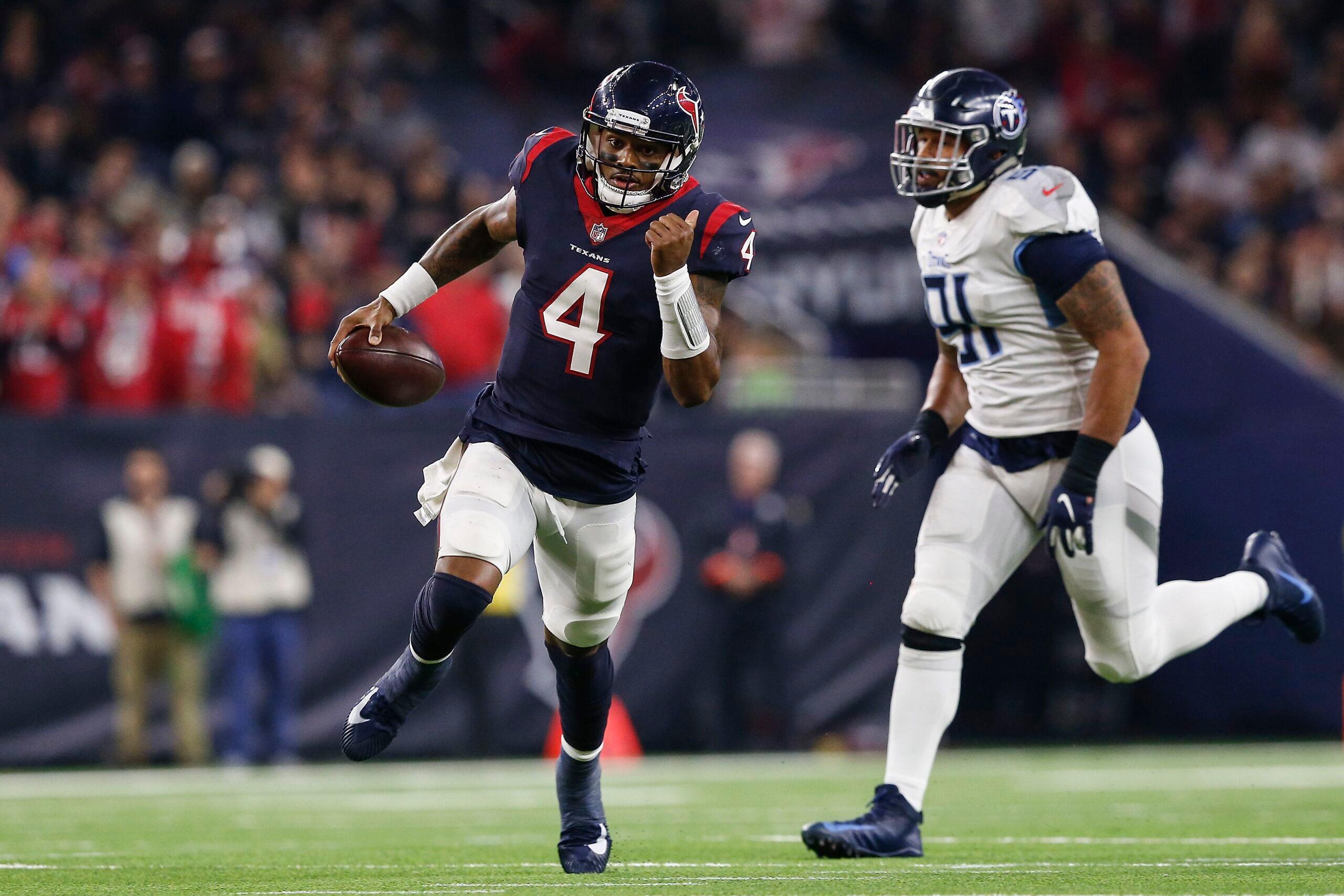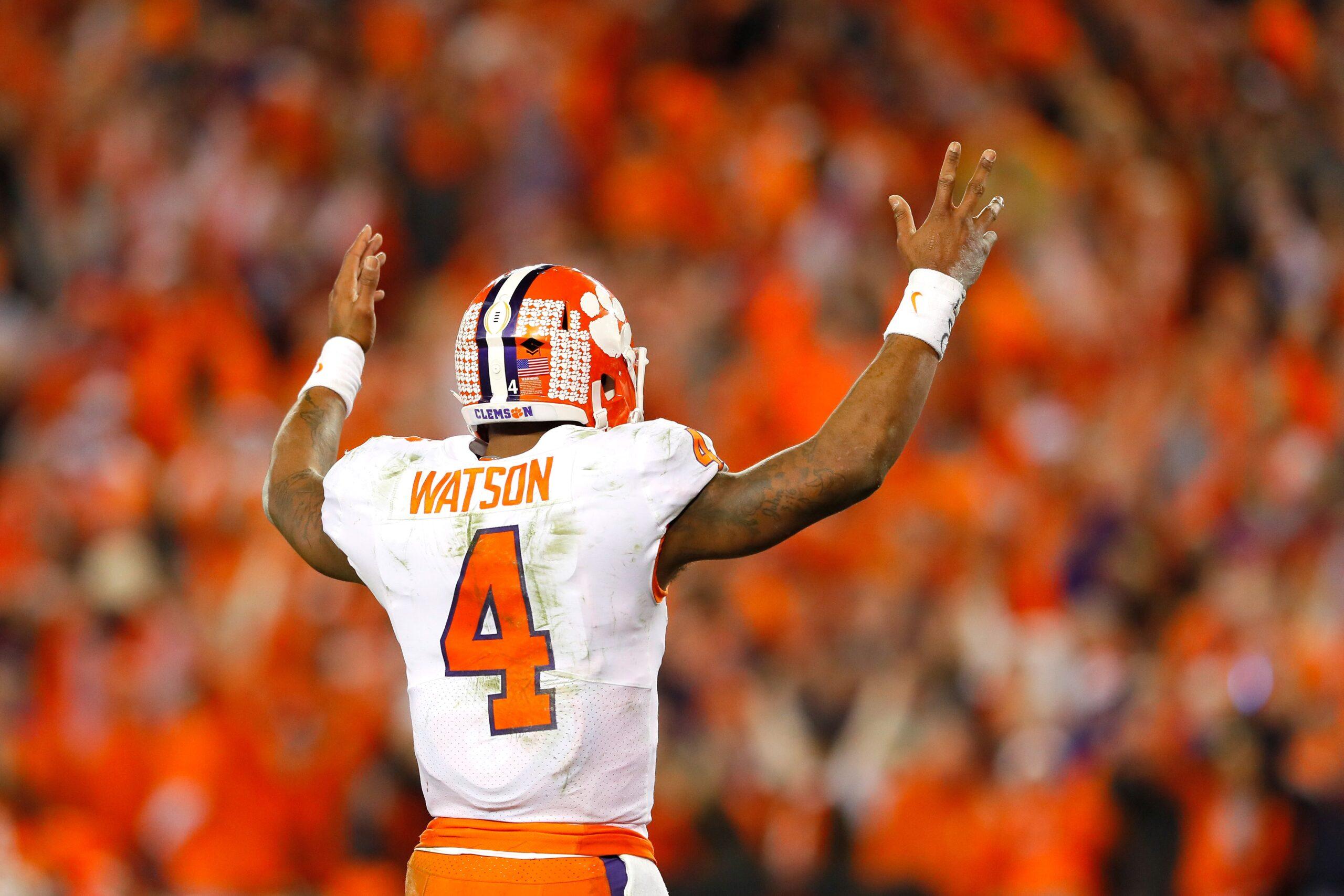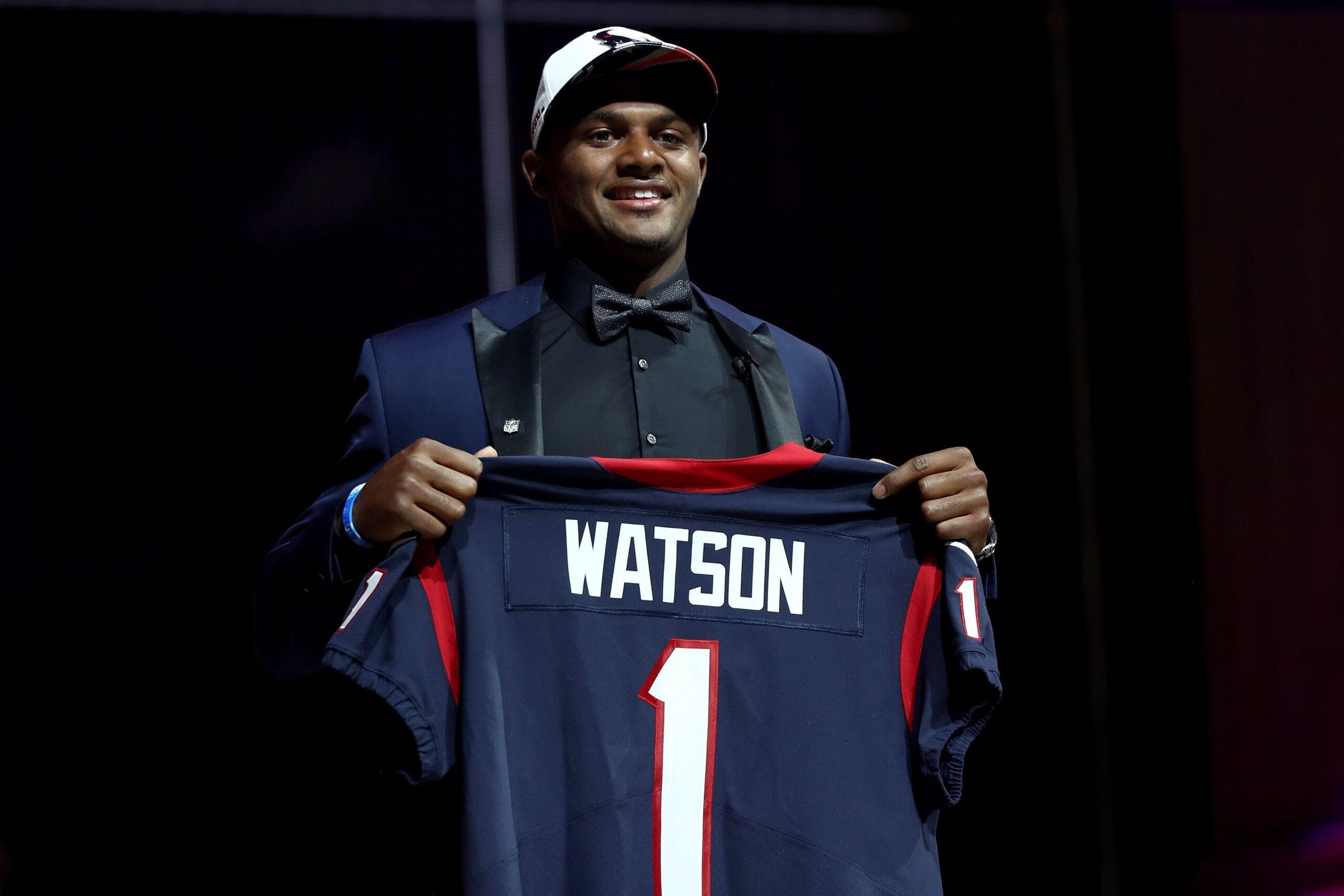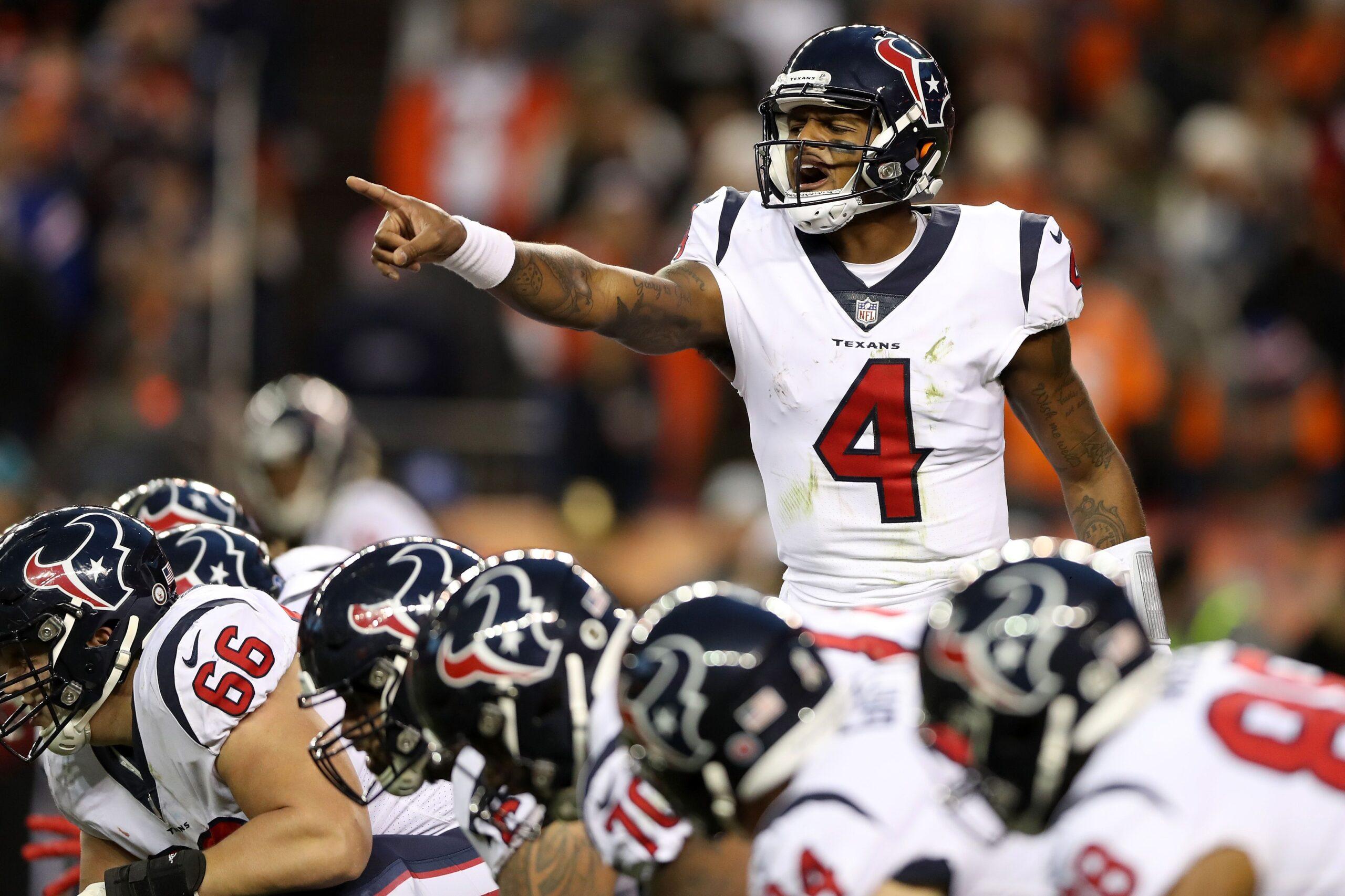In the decade he’d spent around the NFL, Bill O’Brien had never seen anything like it. It was April 2017, and the Texans had invited Clemson quarterback Deshaun Watson to their facility for an official predraft visit. After the Heisman Trophy finalist interviewed and tested his X’s-and-O’s knowledge for much of the morning, the contingent took a break for lunch.
Watson parked at a round table in the far corner of the team cafeteria. Soon, a group of Texans migrated in that direction. At first they were players Watson knew: fellow Clemson guys like defensive tackle D.J. Reader and wide receiver DeAndre Hopkins, or foes from rival schools such as South Carolina product Jadeveon Clowney. But it wasn’t long before the crowd expanded beyond old acquaintances. With 20 or so players crammed into a tight circle, the Texans pushed two tables together to fit everyone looking for a seat. “[Deshaun] had a natural presence about him,” Texans general manager Brian Gaine says. “Players follow him. They listen to him.”
Chad Morris kept telling me, ‘We’re going to win a national championship if we sign this kid.’ And in my head I said, ‘How do you know that?’Gainesville High School football coach Bruce Miller
As O’Brien tells the story, he wants to make it clear that Watson wasn’t holding court. “He’s not really that guy,” Houston’s fifth-year head coach says. No one has ever confused Watson as the boisterous type. But in this case, he didn’t need to regale the congregation with stories. Everyone already knew them. Three months earlier, Watson had knocked off Alabama in one of the most thrilling national championship games in college football history; in the process, he’d cemented his status as one of the greatest collegiate players of all time. In a room featuring a former no. 1 draft pick and multiple All-Pros, he was the main attraction. “It seemed like everybody had a respect for him, based on what he’d done in college and what type of person he was,” O’Brien says. “That was a big deal for us, to be able to see that and how his future teammates were around him.”
Less than a month later, the Texans traded the 25th pick in the 2017 draft and a first-round pick in the 2018 draft to the Browns for the 12th overall selection that spring, which was used to take Watson. The move defined the franchise’s future. In six starts as a rookie, Watson threw 19 touchdown passes. It took a month and a half for him to take over the NFL in much the same way he’d ruled college football. In less than half a season, he became the most exciting player in the entire sport.
Watson’s 2017 impact on both the Texans and the league was cut short when he tore his right ACL last November. Now healthy again, his second year looks a lot like his first. While his unsustainable touchdown rate has dropped, nearly every other aspect of Watson’s game has improved. The 23-year-old quarterback has propelled Houston to a nine-game winning streak and an all-but-certain playoff berth. The Texans haven’t lost since the second day of autumn, and their aspirations are no longer limited to winning just the AFC South: At 9-3, Houston has both the Chiefs and Patriots looking over their shoulders in the race for first-round byes.
Like he has at every stop of his football career, Watson has transformed the Texans organization. He’s also given a franchise — and the city that adores him — reason to believe. “I’m cherishing all the love, especially on the bad days,” Watson says. “I’m doing everything I can to continue to bring joy and excitement to this city.”

One afternoon during Watson’s freshman season at Gainesville High School in Georgia, the QB ducked into head coach Bruce Miller’s office on his way into practice. Watson had found $20 lying on the ground outside. He wasn’t sure what to do next, so he handed the bill to Miller, who stowed it in a desk drawer and didn’t think of it again. Three weeks later, Watson came back and asked Miller how long he should wait before claiming the cash as his own. “I said, ‘As far as I’m concerned, it’s yours,’” Miller says, laughing. “It’s always about others [with Deshaun]. I’m sure in his mind, he thought, ‘Somebody lost $20. I know how bad I’d hate to lose $20.’”
Earlier that summer, Watson had been named Gainesville’s starting quarterback as a true freshman. He’d beaten out the incumbent starter, a rising junior who’d been with the program for years. Miller knew the choice might not go over well. He’d heard the grumbling parents and the skeptics around town. In his mind, though, Watson’s talent was undeniable. “There was no doubt about it that he was our best quarterback,” Miller says.
Gainesville opened the 2010 season at home against perennial Georgia power Buford High School, which had gone 15-1 the previous season on its way to a Class 2A state championship. Watson threw three interceptions in a 40-19 Buford win, but everyone in the stadium learned what Miller had known all summer. “We didn’t win that game, but I just remember him playing so well,” says Mikey Gonzalez, a QB who was a year behind Watson and would become his backup. “You thought, ‘He could be the real deal.’”
I think that for Deshaun, he epitomizes being the face of the program. That’s what he was for this school.Clemson quarterbacks coach Brandon Streeter
That season, Gainesville’s upperclassmen took to calling Watson “Rookie.” But what started as a way to needle a freshman morphed into a term of endearment. Miller says it didn’t take long before players two or three years older began to admire the scrawny young quarterback. “They looked up to him so much,” Miller says. “He was just unflappable. Nothing really bothered him.” Gonzalez remembers watching in awe as a kid who wasn’t old enough to drive took control of the whole program. “No one was like, ‘Oh, he’s only 14 or 15 years old, and I’m 18,’” Gonzalez says. “No one really looked at him as that young because of how mature he was coming in.”
Gainesville followed its season-opening loss to Buford by rattling off 10 straight victories before falling to Cedar Grove High School in the second round of the state playoffs. Watson finished his freshman year with more than 2,500 yards of offense and 22 total touchdowns. By the midway point of the season, Miller says that he had taken to holding up the team bus so Watson could sign autographs for the horde of kids waiting outside. For anyone who saw Watson play that fall, it was clear that both quarterback and program were about to embark on new chapters in their history.
Two years later, Watson passed for 4,024 yards with 50 touchdowns as a junior to power Gainesville to the Class 5A state championship. On the team’s second touchdown drive of the title game, Watson pulled the ball down and barreled over a Ware County High School defender to make the score 14-0. Then the floodgates opened. Watson finished with more than 400 yards of total offense and five touchdowns in a 49-13 rout. It marked Gainesville’s first state championship in the school’s 100-plus-year history.
Yet for all of Watson’s brilliance that night, the moment that sticks with Miller came in the aftermath of the win. As parents and fans spilled onto the field, the team’s seniors joined their coach on a small stage to accept the trophy. Standing next to Miller’s wife, while his teammates celebrated, was Watson. “She said, ‘Deshaun, you need to be up there. You’re the reason we won this thing,’” Miller says. “And he just said, ‘It’s not my turn.’” Gonzalez didn’t realize until a few days later that Watson had shunned the postgame glory, when he saw the photo on the front page of the Gainesville Times and noticed that the team’s star was nowhere to be found.
It’d be easy for Miller to say in retrospect that he understood what his decision to anoint a 14-year-old as starting quarterback would bring. At the time, though, it was difficult to grasp the gravity of what was transpiring. Every so often, an outside perspective was needed to appreciate how special Watson was. When then–Clemson offensive coordinator Chad Morris saw Watson for the first time, that’s precisely what he provided. “Chad Morris kept telling me, ‘We’re going to win a national championship if we sign this kid,’” Miller says. “And in my head I said, ‘How do you know that?’”

Brandon Streeter met Watson the day before Deshaun’s first ACL surgery, in December 2014. Watson had torn the ligament in his left knee during practice a couple of weeks earlier, but that didn’t stop him from playing in Clemson’s rivalry game against South Carolina. Despite the injury, Watson went 14-of-19 passing for 269 yards with two touchdowns in a 35-17 win. The then–true freshman’s decision to push through the pain made his teammates take notice. “You hear a lot about a kid, and everything was so true,” says Streeter, Clemson’s quarterbacks coach. “Just about how he carries himself.”
As people in the NFL wondered this offseason about the toll Watson’s recent ACL tear would take, many pointed to how well he’d handled the injury from 2014 as cause for optimism. But to hear Streeter tell it, Watson had no doubt he’d be fine even then. “He already had a mind-set before the surgery that he was going to come back stronger than ever,” Streeter says. “Whereas a lot of people would be hesitant to even comment on something like that, he just had it in his mind that he wanted to prove to people that he could come back faster than they were saying and better than ever before.”
In tough situations, he ain’t breakin’. He’s a born leader.Artavis Scott, former Clemson wide receiver
The way Watson speaks can be jarring for those first encountering it. He responds to questions in terse, straightforward snippets, with a directness more distinctive than disarming. He’s blunt because he finds his declarations to be self-evident, no matter how outlandish they might seem to others. Clemson head coach Dabo Swinney’s now-infamous line that any team that passed on Watson in the 2017 draft would be “passing on Michael Jordan” has taken on a life all its own, but when it comes to both athletes’ unwavering belief in their own ability, the comparison is apt. “He will make it look easy,” Streeter says. “He’ll figure it out, and he’ll get it done. And everybody around him knew he was going to do that. He created that confidence level for the whole program.”
Streeter played quarterback for Clemson during the 1990s, and his first job as a graduate assistant came on Tommy Bowden’s Tigers staff in 2004. When Streeter returned to the school as quarterbacks coach a decade later, he could sense that Watson was lifting the program to new heights. The Tigers opened the 2015 season 14-0 to earn a trip to the national title game, where Watson racked up 478 total yards with four touchdowns during a 45-40 loss to Alabama. That was just the first taste of the rarefied air where Clemson now belongs. “I think that for Deshaun, he epitomizes being the face of the program,” Streeter says. “That’s what he was for this school.”
A year later, the Tigers returned to college football’s biggest stage, once again meeting Alabama for the national championship. The Crimson Tide raced to a 24-14 lead, but the Tigers clawed back. When Clemson got the ball down 31-28 with just more than two minutes remaining in the fourth quarter, Watson delivered a message in the huddle that is now etched in stone. He told his teammates, “Let’s be legendary.” A few minutes later, they were.
Streeter says such exchanges had become commonplace with Deshaun at Clemson. Earlier in the 2016 season, with the Tigers trailing third-ranked Louisville by a touchdown in the fourth quarter, Streeter looked at his quarterback and asked how he was feeling. In typical Deshaun fashion, the response was curt: I got this. He’d go on to uncork a 31-yard touchdown pass that brought Clemson a 42-36 win. Against Bama, Watson completed his first five passes on that final drive, then hit Hunter Renfrow in the right corner of the end zone with one second left.
“Let’s go look at all the games that were big-time games, big situations, and let’s see how he played,” Streeter says. “He played lights-out every single time. There was never too big of a scenario for him. He thrived in those situations, where it was crunch time and he had to go score.”
Artavis Scott was in that huddle against Alabama when Watson uttered the fabled final words of his Clemson career. The wide receiver, like he had so many times before, believed in his quarterback. “When it’s the fourth quarter, and you’re down three points, you want him to be the guy who goes in there and makes everything go,” Scott says. “In tough situations, he ain’t breakin’. He’s a born leader. Most people say it, but they don’t really live it. I’ve seen it.”
Watson and Scott roomed together as freshmen. Scott had known of Watson before meeting him, as he’d scoured the internet for clips of the celebrated quarterback who’d throw passes to him when they arrived on campus. But two days before their first spring practice, Scott started to grasp what set Watson apart. At around 8 p.m., they were sitting on the couch when Watson asked Scott if he wanted to head to the stadium to play catch. For about an hour, with the lights blazing in Death Valley, Scott ran dozens of routes as Watson fired the ball his way. The stadium went dark, but neither was willing to stop. They threw well into the night, with only the fading glow of bulbs to guide them. “From that point on, I was like, dang,” Scott says. “He’s willing to work.”

What Bruce Ellington remembers most was the roar of the crowd. At halftime of Week 1 last season, Houston trailed Jacksonville 19-0 at home. Texans starting quarterback Tom Savage had been sacked six times and lost two fumbles. The team had made what O’Brien called “an organizational decision” during the offseason to bring Watson along at his own pace, but as the offense teetered on the brink of collapse, O’Brien knew his young QB’s wait period was over. “As a head coach, you have an instinct,” he says. “You see what’s going on — and it wasn’t one person’s fault — but we just needed a spark. We were playing a division rival. We weren’t playing well. We felt like he could spark us. I felt like the locker room believed in him.”
O’Brien pulled Savage to the side and informed him that he was going with the rookie. When the rest of the team heard the reaction as Watson started getting loose, they knew. “The atmosphere from the fans, when he walked in, was amazing,” says Ellington, a receiver who’s now with the Detroit Lions. “I think a new regime started with him being our quarterback. For everybody, from the head man up top, to the equipment guy down low — I think everybody felt that it changed a lot of things.”
We knew we had a quarterback who didn’t have fear. The only person he fears is God.Bruce Ellington, former Texans wide receiver
That change was clear immediately. Watson’s 49-yard touchdown run in Week 2 was the decisive score in a 13-9 win over the Bengals. The following week, he strung together a handful of exhilarating deep throws to keep pace with Tom Brady in a 36-33 road loss to the Patriots. Over the next four games, Watson threw a staggering 16 touchdown passes, with nearly 20 percent of his attempts traveling at least 20 yards in the air. (No other qualified NFL quarterback topped 16.5 percent last season.) On the first drive of Houston’s Week 8 visit to Seattle, Watson unleashed a bomb to Will Fuller that traveled 60 yards in the air for the opening score. What followed over the next four quarters was a back-and-forth aerial display between Watson and Russell Wilson, who combined for 854 passing yards in the Seahawks’ 41-38 win. Watson’s effort was proof that he could turn any given play into a 50-yard completion, and the possibilities energized each member of the offense. “Everybody around the locker room started to believe,” Ellington says. “We knew we had a quarterback who didn’t have fear. The only person he fears is God.”
Two quarterbacks, North Carolina’s Mitchell Trubisky and Texas Tech’s Patrick Mahomes II, were taken ahead of Watson in the 2017 draft. Still, he maintains that being passed over didn’t irk him. “I did everything I could do at Clemson,” Watson says. “I graduated. Won a national championship. Went 33-3. ... Went to two Heisman [ceremonies], all that. It’s really just the teams. That’s out of my control.” Watson insists that watching two passers with vastly inferior résumés come off the board at no. 2 and no. 10, respectively, did nothing to change his outlook. He was always going to transform an NFL franchise, just like he had his teams in high school and college. “I was just waiting,” Watson says. “Whoever picked me up, as an organization, was going to get a guy who was going to perform and be the best guy coming out of that class.”
Deshaun’s magical six-game run last fall became the most captivating story in football, and seeped into every part of the Texans’ operation. When Watson heard that a trio of cafeteria workers had lost everything after Hurricane Harvey, he split a game check three ways and gifted them the money. Mike Parson recalls pulling Watson aside after hearing about the gesture. Parson has served as the team’s director of equipment services for four years, but has been with the franchise for more than a decade. He made sure that Watson knew what the QB can mean to an entire generation of Texas football fans. “I was telling him, there are so many kids in this country — especially in the city of Houston — that look up to him,” Parson says. “He has a story that can affect so many kids, just by the way that he carries himself and the way that he goes about doing his business. He’s one of those guys, that hopefully for a long time, can be a positive influence.”

On a cloudless August afternoon in White Sulphur Springs, West Virginia, Watson stood near the makeshift cold tubs outside the team’s temporary locker room at Greenbrier Resort. With a small yellow towel draped over his head, he described the ACL injury that ended his rookie season. “I think differently than most guys,” he says in his matter-of-fact tone. “Regardless of the challenge, the adversity, I know I’m going to get through it.”
Watson tore the ligament on a nondescript move he’s made thousands of times. Running to his right, with Ellington trailing for a pitch, Watson cut hard upfield when his right knee locked up. “Trainer came over, checked him out, and the next thing you knew, he was gone on a cart,” O’Brien says. Later that day, Ellington and other players texted their quarterback to find out the diagnosis. They all received the same response: ACL.
Whoever picked me up, as an organization, was going to get a guy who was going to perform and be the best guy coming out of that class.Deshaun Watson
The ascension of Watson’s Texans was put on hold. But after a miserable 0-3 start to this fall, Deshaun has once again ignited Houston’s hopes. His interception rate has dropped from 2017, his completion percentage has jumped by nearly 5 percentage points, and his 8.3 yards per attempt equals his mark from last year. He’s done it all while facing pressure on 43.3 percent of his dropbacks, the second-highest rate in the NFL. Watson is on pace to throw for 4,041 yards, and the Texans have a commanding three-game lead in the division. If Kansas City or New England stumbles down the stretch, Houston could claim a top-two seed in the AFC.
Watson’s play this season has gone from sheer brilliance to considered excellence. His consistent queries to O’Brien are no longer limited to Houston’s offense. He’s homed in to why a certain receiver’s skill set can exploit particular cornerbacks. And he works with Tyrann Mathieu each week to learn how certain throws can manipulate coverage leverages and to interrogate the veteran safety on why he breaks on specific routes. “Carson [Palmer] used to do it a lot in Arizona,” Mathieu says, “but it’s a little bit more exciting to see it come from a second-year guy than a [14]-year pro.”
The way that Watson has been able to invigorate a player like Mathieu — a former All-Pro who never shares the field with his QB — is representative of what O’Brien views as the quarterback’s greatest strength. He likens his influence to the impact made by another veteran passer, adding another all-time great to the list of Watson comparisons. “There’s belief in Tom [Brady],” O’Brien says. “There’s belief in Deshaun. There’s belief that he’s going to help them win. When you have a quarterback that’s good like that, that has the belief of his teammates, it affects the whole team.”
As the Texans barrel toward the postseason for the first time in Watson’s career, O’Brien recognizes the fervor that’s taken hold of a football-crazed town. Houston has been waiting a long time for Deshaun Watson. And now he’s here. “This city is starving for a winner,” O’Brien says. “We’ve won. Coach [Gary] Kubiak won here. We’ve had two division championships here. But there’s been no Super Bowl here. You see this kid, and you know this is a special guy.”